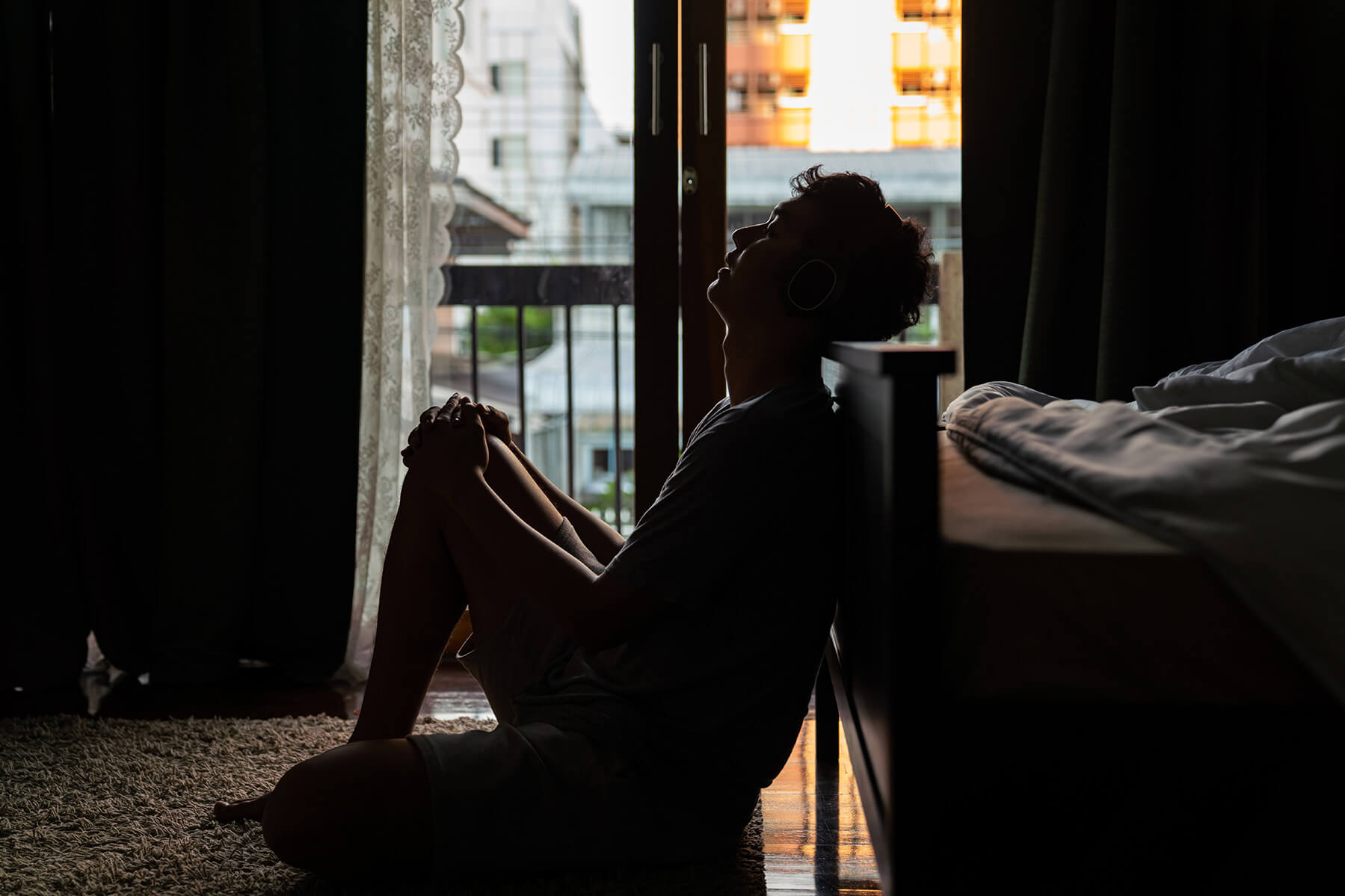
When I finally realised I needed to get help for my mental health issues, therapy was my top priority.I didn’t like the idea of taking anti-depressants. Talking therapy felt like the right option, a way to sort out my head without risking any side-effects or becoming dependent on pills.But here’s the thing.Therapy is time intensive. It requires more time and effort than just prescribing medication.When I started talking about my mental health on the internet, I noticed loads of comments warning me that doctors would throw medication at the problem, and that therapy would be near-impossible to get through the NHS.So when I went to my GP, I braced myself for a difficult time. I prepared to fight my corner, request therapy with confidence, and refuse to take medication without any therapy to go along with it.Then the GP portion of things turned out to be surprisingly easy. Oh.
My doctor told me that alongside prescribing medication, he’d also suggest ‘some form of talking therapy’, explaining that he felt it was important that anyone taking anti-depressants was also given some kind of therapy, too.So no fighting my case. No repeatedly explaining why therapy was so important to me. I had someone who was listening,understanding, and taking my side.Which gave me a lot of hope.Then it came to the actual trying-to-get-therapy bit.And that’s where things got a little tricky.My GP told me that to get therapy, I’d just need to call a number.The next day, I did. No answer.I tried again after work. No answer.I tried the day after. Lots of ringing. Still no answer.
I started to worry that I’d somehow taken the number down wrong, or that my GP actually wasn’t recommending therapy, but just wanted to slowly drive me insane with unanswered phone calls just to see what would happen.*Why yes, my anxiety and depression does sometimes manifest in paranoia and a lack of trust in other people. How did you know?The day after that I committed my lunch break to getting through. I decided I would call every ten minutes until someone picked up.Of course, this time they picked up on the first ring.I explained that my doctor had told me to call the number and get therapy, and was told that actually, what I’d need to do is fill out a form online to self-refer. Once I’d done that, the therapy-organising people would call me in the next two weeks.I went back to my desk, googled what the very nice lady on the phone had told me to google, and discovered that the entire site was down.
Agh.
I tried the next day. Same thing.And the day after.But because apparently this process is down to sheer luck and refusing to give up, I managed to get through on the third day.By this point, I’d been on medication for over a week without any therapy to go with it.The self-referral form was intense, and it made me really think about just how bad I’d been feeling over the last few months.It asked me to describe what was bothering me, select which areas of my life my issues were affecting, and to choose what feelings were bothering me most from a drop-down menu. It took me a while to choose between anxiety/panic and sadness, but I opted for the former.
Then the form listed out symptoms, asking me if I’d experienced specific feelings over the last two weeks – and how frequently.As I clicked my way through a checklist of sleeping troubles (I have trouble falling asleep when I’m struck with obsessive fears that ovens and light switches have been left on), having little interest or pleasure in doing things (my weekends spent in bed indicate yes), and feeling afraid that something awful might happen (always), the effects of my depression and anxiety really started to sink in.I was ticking ‘several days’ and ‘more than half the days’ for a lot of symptoms.Suddenly, it became clear that a lot of the things I’d been experiencing – being irritable and restless, for example – were likely down to the same cause.Maybe my commute hadn’t become increasingly frustrating over the last six months. Maybe my area hadn’t become overrun with slow-walkers. Maybe my short temper and impatience aren’t just symptoms of living in a city, but another sign that I need help.Once I hit submit, the nerves set in.
I hated the idea that someone would look through my answers and have the power to make a judgement on what I needed without talking to me first. I worried that they’d decide that actually, I didn’t deserve therapy.Two days later, I got a call back.They explained that from my responses on the form, they’d decided that I’d likely need therapy. But first, they explained, they’d arrange a phone call so they could work out the best course of action.On a Monday morning, I sat on my bed for 40 minutes and told a stranger things I’d been scared to tell anyone else.She asked if I’d ever considering hurting myself, what my panic attacks felt like, what I thought would happen if I left a switch turned on or didn’t check I’d locked the door.She asked my to rate the likelihood that I’d try to end my life out of ten. I chose a three.
I tried not to cry as I explained how my anxiety was affecting my relationships, my work, my health. I tried not to downplay things when she asked how low moods affected my life, and I explained that when I left work (where writing kept me distracted from bad thoughts) I kept coming home and doing nothing, worrying until I was tired enough to sleep.I felt like I sounded crazy.If talking to a GP about my mental health felt like the emotional equivalent of getting naked, this felt like peeling back skin. I felt more vulnerable and exposed than I’d ever been.But the woman on the other end of the phone didn’t judge. She didn’t tell me I was crazy. She gently asked more questions, laughed when I laughed, and pushed me to talk when my sentences trailed off or I tried to minimise what I was feeling.
After forty minutes, she explained that it was likely that they’d recommend cognitive behavioral therapy, but that she’d just need to check with her supervisor.She told me to expect a call within the next two weeks, but that evening I saw I had a voicemail.I listened to a voice telling me that I’d be getting CBT.I finally felt heard. I wasn’t being dramatic. I wasn’t imagining things.Finally, someone else was saying that I needed and deserved help.I felt an immense sense of relief.But when I called back to arrange an appointment, that high came crashing down.They explained that I’d need to be put on a wait list for CBT, and that the process could take three to four months.I couldn’t take the thought of coming so far, of finally overcoming my fears and asking for help, and then having to keep struggling alone for months. I couldn’t go back to feeling like I was doing nothing. And I definitely couldn’t continue taking medication without any emotional support to go alongside it.
Thankfully, there were other options.They explained that while in-person therapy had a months-long waiting list, I could sign up for online therapy – either in video, text, or phone call form – tomorrow.Even though in-person, talking therapy seemed like the best possible option, I decided I’d try phone call style therapy in the meantime (I felt like text-based therapy would make it too easy for me to lie or downplay what was going on, while video therapy would just make me worry about how wonky my face looks on camera).
I’m disappointed to learn that it’s not as easy to get in-person talking therapy, which I feel would help me the most, as I thought.It’s frustrating that there are so many people with mental health issues unable to get the support they need, simply because the funding’s not there, doctors are overworked, and we’re not taking taking mental health care as seriously as they should.It shouldn’t be the case that the easiest, quickest way to get therapy you need requires paying for it.
I’m now considering budgeting to pay for my own therapy once I’ve completed the online CBT I’ve been given, if only so I can be reassured that I won’t have to end up waiting months to sort myself out.But in the meantime, I’ve signed up through a program called Big White Wall, and should be able to arrange my first phone call based appointment in the next week.It’s not exactly what I hoped for. I’m still a little disappointed that I won’t be able to get in-person therapy as quickly as possible.But I’m hopeful about what online therapy will bring or try other options.
or contact:
Relate West Surrey
www.relatewestsurrey.org.uk
01483 602998
for a face to face Initial Assessment appointment









